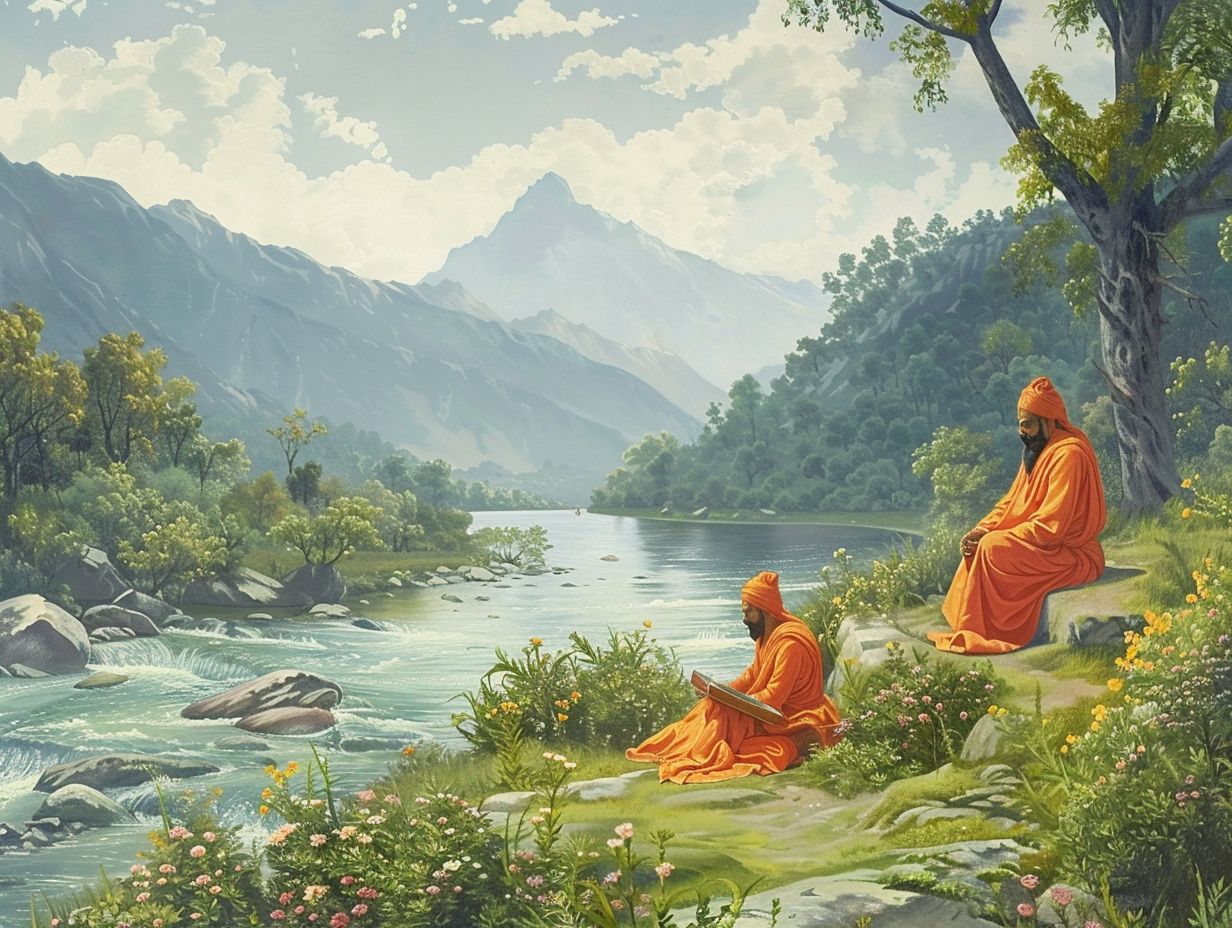Teachings and Influence of Shankaracharya
Shankaracharya, a monumental figure in Indian philosophy, is revered for his significant contributions to the spiritual landscape through his teachings on Advaita Vedanta.
Emerging in an era characterized by philosophical diversity, his formative years and education established a foundation for revolutionary ideas that would challenge the status quo.
This exploration delves into his key teachings, including the intricate concept of Maya and the pivotal role of the Guru, while also scrutinizing his enduring impact on Hinduism, the controversies that have emerged around his legacy, and the ways in which his insights continue to motivate spiritual seekers in contemporary times.
This journey invites one to uncover the life and teachings of this extraordinary sage.
Who is Shankaracharya?

Shankaracharya, a distinguished philosopher and theologian from ancient India, is renowned for his pivotal contributions to the Advaita Vedanta school of thought. This philosophical framework advocates for non-dualism, positing that Brahman represents the ultimate reality and Atman embodies the true self.
His teachings have profoundly shaped the landscape of Hinduism, underscoring the vital significance of enlightenment and spiritual awakening. Through practices such as meditation, self-inquiry, and an in-depth study of sacred texts, including the Upanishads and the Vedas, Shankaracharya s legacy continues to inspire seekers on their spiritual journeys.
Early Life and Education
Shankaracharya’s early life is imbued with profound spiritual significance and a quest for philosophical understanding. Born into a Brahmin family in Kerala, India, he displayed remarkable intellect and unwavering devotion from an early age, prompting him to seek the guidance of a revered guru.
His foundational education consisted of a rigorous study of the Vedas and Upanishads, which set the stage for his transformative teachings in the philosophy of Advaita Vedanta.
Teachings of Shankaracharya
The teachings of Shankaracharya present a profound tapestry of philosophical insights anchored in Advaita Vedanta, championing the idea of non-dualism where the distinction between Brahman and Atman seamlessly dissolves. This dissolution paves the path to ultimate liberation (moksha) and self-realization.
His insightful discourses on consciousness and the essence of reality have solidified his status as a pivotal figure in the realm of Hindu philosophy and spiritual practice.
Advaita Vedanta
Advaita Vedanta, a profound philosophical framework established by Shankaracharya, asserts the non-duality of Brahman the ultimate reality and Atman, the individual self. This philosophy challenges conventional notions of duality and separation in consciousness, inviting individuals to delve into their true nature, transcending the apparent distinctions between the self and the cosmos.
Rooted in the ancient spiritual traditions of India, Advaita Vedanta emerged during the early medieval period, drawing inspiration from texts such as the Upanishads, which eloquently emphasize the oneness of existence. At its essence, this philosophy teaches that the realization of the essential unity between Atman and Brahman is the key to liberation (moksha) from the relentless cycles of birth and rebirth (samsara).
Such insights provoke profound philosophical inquiries into the nature of reality and consciousness, compelling seekers to reconsider their understanding of existence. Shankaracharya’s teachings articulate these concepts with clarity, advocating for a disciplined approach to knowledge and meditation that unveils the interconnectedness of all beings.
Concept of Maya
The concept of maya, or illusion, stands as a cornerstone of Shankaracharya’s Advaita Vedanta philosophy, asserting that the perceived duality of the world obscures the ultimate reality of non-dual consciousness. This profound understanding invites individuals to critically examine their sensory experiences, encouraging them to recognize that what they perceive as separate entities are merely projections of a deeper, singular essence.
In the framework of Advaita Vedanta, maya is not wholly deceptive; rather, it functions as a lens through which individuals can begin to navigate the complexities of existence. Shankaracharya articulates that while the universe may seem diverse and multifaceted, this multiplicity is but a veil that conceals the underlying truth of Brahman, the absolute reality.
Discussions surrounding maya frequently focus on its pivotal role in the journey toward self-realization, igniting dialogues about how one might transcend illusion to experience the oneness that lies beneath the surface of apparent differences.
Importance of Guru
In the philosophy of Shankaracharya, the role of the guru is of utmost importance, acting as the guiding force for the disciple in their pursuit of enlightenment and self-realization within the framework of Advaita Vedanta. This relationship between the guru and disciple embodies a sacred bond that transcends mere instruction, grounded in compassion, wisdom, and the transmission of experiential knowledge.
Shankaracharya himself exemplified this principle through his extensive travels, teaching and initiating numerous students, thereby nurturing a community dedicated to spiritual awakening. The guru provides not only theoretical knowledge but also practical guidance, assisting disciples in navigating the complexities of their spiritual journeys.
Texts such as the ‘Guru Gita’ emphasize the reverence afforded to the guru as a divine embodiment of knowledge, illustrating that true understanding emerges from the teacher s insights and experiences. Ultimately, the earnest quest for self-realization is often illuminated by the presence of a guru who serves as a mentor, confidant, and catalyst for transformation.
Path of Self-Realization

The path of self-realization, as articulated by Shankaracharya, represents a transformative journey toward understanding one’s true nature and achieving enlightenment through dedicated practices of meditation and introspection.
By incorporating regular meditation into their lives, individuals can cultivate a deep sense of inner peace and clarity, enabling them to explore the very essence of their being. Self-inquiry, a pivotal technique championed by this esteemed sage, urges seekers to interrogate the nature of their thoughts and perceptions, gradually unveiling the layers of illusion that obscure the fundamental reality of the self.
These practices transcend mere ritual; they are fundamental to the philosophy of Advaita Vedanta, which underscores the non-duality of existence and posits that the individual soul ultimately merges with universal consciousness. As seekers immerse themselves in these teachings, they embark on a profound journey that facilitates liberation from the constraints of ego, culminating in a harmonious union with the cosmos and the fulfillment of their spiritual aspirations.
Influence of Shankaracharya
The influence of Shankaracharya is both profound and enduring. His teachings have significantly shaped the Advaita Vedanta school of thought, leaving an indelible mark on Hinduism and Indian philosophy.
Over the centuries, his insights have influenced a multitude of philosophical schools and spiritual practices, highlighting the timeless relevance of his work in the broader tapestry of intellectual and spiritual discourse.
Spread of Advaita Vedanta
The spread of Advaita Vedanta, as championed by Shankaracharya, has profoundly shaped the spiritual landscape of India and beyond. His teachings, disseminated through a network of dedicated disciples and various religious texts, have fostered a deeper understanding of non-dualism among practitioners.
These disciples were instrumental in their efforts, traversing the Indian subcontinent to establish monasteries and teaching centers that became vibrant hubs for spiritual learning. The creation of seminal texts, such as the Upadesa Sahasri and insightful commentaries on the Brahma Sutras, further solidified the philosophical underpinnings of Advaita.
Through these collective endeavors, the core principles of non-dualism not only permeated local societies but also intertwined with other philosophical currents, enriching the cultural tapestry of Hinduism. This dissemination of knowledge represented a pivotal shift, rendering profound spiritual insights accessible to a wider audience and significantly enriching the spiritual discourse of the era.
Establishment of Four Mathas
The establishment of the Four Mathas by Shankaracharya was a masterstroke aimed at institutionalizing Advaita Vedanta, creating spiritual centers that would function as pivotal hubs for teaching, scholarship, and the preservation of his philosophical legacy.
These esteemed institutions, strategically situated at key geographical locations across India Shingarimath in the north, Sringeri Sharada Peetham in the south, Dwaraka in the west, and Puri in the east have been instrumental in the dissemination of his teachings.
Each Matha not only provided rigorous education in the principles of non-duality but also acted as steadfast custodians of the tradition, ensuring that the wisdom of Advaita Vedanta flourished through the ages.
In contemporary times, these establishments continue to wield significant influence over the spiritual landscape, inspiring countless seekers and scholars to explore the intricate nuances of this profound philosophy, thereby fostering a deeper understanding of unity and the essence of reality.
Impact on Hinduism
Shankaracharya’s influence on Hinduism is nothing short of monumental; his teachings have redefined the spiritual landscape by championing the principles of Advaita Vedanta, which emphasize non-dualism. They offer a coherent framework for understanding the nature of reality and the self.
His philosophical insights have revitalized the intellectual discourse within the tradition and transformed the way adherents engage with their spiritual practices and rituals. By underscoring the unity of Atman and Brahman, Shankaracharya encourages followers to pursue direct experiential knowledge, prompting a significant shift from a ritualistic focus to a more introspective and meditative path.
This redirection has ignited deeper philosophical inquiries, compelling practitioners to scrutinize their perceptions of separateness. As a result, it has fostered a culture of inquiry and reflection that permeates various facets of Hindu worship and community life.
Inspiration for Modern Spiritual Leaders
Shankaracharya’s teachings persist as a profound source of inspiration for contemporary spiritual leaders, who draw from Advaita Vedanta to promote spiritual awakening and self-realization within modern contexts. Today’s thought leaders frequently weave Shankaracharya’s emphasis on the unity of existence into their practices, encouraging their followers to transcend the illusion of separateness.
Prominent figures such as Sadhguru and Mooji exemplify these principles, offering retreats and teachings that resonate with the essence of non-dualism while adeptly addressing the complexities of modern life. Their approaches to meditation and mindfulness reflect Shankaracharya’s insights, skillfully adapting them to confront prevalent issues such as stress, anxiety, and disconnection.
By reinterpreting Advaita Vedanta to address contemporary spiritual challenges, these leaders enhance the understanding of interconnectedness, nurturing a sense of community and collective growth among their followers.
Controversies Surrounding Shankaracharya

The life and teachings of Shankaracharya have been marked by a notable degree of controversy. He encountered opposition from Buddhist and Jain scholars who fervently challenged his philosophical assertions.
Additionally, he faced accusations of religious intolerance, along with ongoing debates concerning the authenticity of his writings.
Conflict with Buddhist and Jain Scholars
Shankaracharya faced considerable conflict with Buddhist and Jain scholars, which sparked a vibrant dialogue in philosophical discourse as he ardently defended Advaita Vedanta against critiques regarding non-dualism and the nature of reality.
This intellectual confrontation transcended mere differences in philosophical schools; it represented a profound inquiry into existence, perception, and the essence of ultimate truth. The Buddhist focus on emptiness and the Jain insistence on multiplicity posed significant challenges to the non-dualistic perspective advocated by Shankaracharya.
As these debates unfolded, they not only sharpened his philosophical arguments but also enabled him to articulate the distinctiveness of Advaita Vedanta with greater clarity. He addressed prevailing misconceptions and laid a more robust foundation for understanding the concept of oneness.
Consequently, his interactions with these traditions catalyzed the evolution of his teachings, allowing him to refine his views on pivotal concepts such as Brahman and Maya, ultimately enriching the spiritual landscape of Indian philosophy.
Accusations of Religious Intolerance
Accusations of religious intolerance have been directed at Shankaracharya, often arising from his vigorous defense of Advaita Vedanta and his critiques of competing philosophical schools. These allegations frequently emerge in response to his incisive criticisms of differing ideologies, which some perceive as a blatant dismissal of alternative spiritual perspectives.
However, a contextual examination of his critiques reveals a more profound philosophical intent; Shankaracharya sought to illuminate what he viewed as misconceptions within rival traditions while fervently advocating for a non-dualistic understanding of reality. This methodology not only shaped his teachings but also significantly influenced how his followers and scholars have interpreted his work across the centuries.
While some critics interpret these critiques as divisive, others contend that they were designed to clarify and reinforce the principles of Advaita, fostering a richer dialogue among various schools of thought.
Debate on Authenticity of Writings
The authenticity of the writings attributed to Shankaracharya has ignited substantial debate among scholars, prompting inquiries into the historical context and the genuine nature of his philosophical contributions. Such discourse carries considerable weight in comprehending his teachings, particularly concerning Advaita Vedanta, as it shapes the interpretations presented by both followers and philosophers in contemporary discourse.
Many contend that the absence of a clear consensus regarding which texts authentically belong to Shankaracharya complicates the endeavor to fully understand the essence of his Advaitic philosophy. This ambiguity can lead to a diversity of practices and beliefs among practitioners, ultimately influencing the perception and teaching of Advaita Vedanta in modern contexts.
The ongoing discussion surrounding these writings often mirrors broader trends within the study of Indian philosophy, affecting how scholars navigate the intricate interplay between tradition and modernity.
Legacy of Shankaracharya
The legacy of Shankaracharya persists, profoundly influencing the ongoing practice of Advaita Vedanta. His teachings have guided countless seekers of truth and have played a pivotal role in shaping the spiritual evolution of Hinduism and the broader landscape of Indian philosophy across the centuries.
Continued Practice of Advaita Vedanta
The ongoing practice of Advaita Vedanta stands as a testament to Shankaracharya’s profound influence, with spiritual seekers and practitioners embracing his teachings across various contemporary spiritual traditions.
In today s world, numerous individuals gravitate toward Advaita Vedanta, drawn by its emphasis on non-duality and the realization of the self as an integral part of an interconnected whole. This philosophical approach fosters personal introspection, guiding seekers toward an understanding of their inner essence that transcends societal constructs.
Yoga studios, meditation centers, and online platforms are increasingly weaving these timeless teachings into their offerings, creating environments where individuals can delve into profound philosophical inquiries. Consequently, Shankaracharya’s insights resonate across diverse contexts, facilitating a harmonious blend of ancient wisdom and contemporary spiritual practices that inspire unity and awareness among modern practitioners.
Celebration of Shankaracharya Jayanti

Shankaracharya Jayanti is celebrated each year to honor the birth of this illustrious philosopher and spiritual teacher, inviting reflection on his teachings and their enduring significance within Advaita Vedanta.
This day serves not only as a commemoration of the profound wisdom he imparted but also as an opportunity for communities to engage in traditional rituals and practices that demonstrate their respect and reverence for his remarkable legacy.
Observances typically encompass prayers, the chanting of mantras, and discussions centered around his philosophical texts, which continue to inspire countless individuals on their spiritual journeys.
As people convene in temples or homes, they share insights into the principles of non-duality that he championed, cultivating a deeper understanding of his teachings that remain strikingly relevant in contemporary society.
The celebration plays a crucial role in elevating awareness of his contributions to spirituality and encourages individuals to delve into the richness of Advaita Vedanta.
Influence on Indian Philosophy and Culture
The influence of Shankaracharya on Indian philosophy and culture is nothing short of profound, as his teachings have intricately woven themselves into various philosophical systems, significantly enriching the vast fabric of India’s spiritual heritage.
His deep insights into Advaita Vedanta, which underscores the non-dual nature of reality, have ignited a renaissance in the interpretation of ancient texts. This intellectual awakening challenges both scholars and practitioners to engage more deeply with the essence of existence. Such a philosophical framework not only enhances academic discourse but also inspires countless seekers of truth to embark on their own spiritual journeys.
Shankaracharya’s advocacy for the unity of the Atman and Brahman has cultivated an inclusive approach within diverse religious practices, promoting harmony and dialogue among varying schools of thought. Consequently, the legacy of his teachings continues to resonate in contemporary philosophical dialogues, effectively bridging the wisdom of history with the modern existential inquiries that shape today’s spiritual landscape.
Frequently Asked Questions
What were the main teachings of Shankaracharya?
Shankaracharya’s main teachings revolved around the concept of Advaita Vedanta, which emphasizes the ultimate unity and oneness of the individual soul (Atman) and the universal soul (Brahman).
How did Shankaracharya’s teachings influence Hinduism?
Shankaracharya’s teachings had a profound impact on Hinduism, as they helped to revive and strengthen the religion during a time of decline. His emphasis on Advaita Vedanta also helped unify the many sects of Hinduism.
What is the significance of Shankaracharya’s interpretation of the Upanishads?
Shankaracharya’s interpretation of the Upanishads, known as the Prasthanatrayi, is considered a key foundation of Hindu philosophy. It provided a logical and systematic approach to understanding the Upanishads and their teachings.
How did Shankaracharya’s influence extend beyond Hinduism?
Shankaracharya’s teachings not only had a major impact on Hinduism, but also on other Indian religions such as Buddhism and Jainism. He also played a role in the revival of Vedic practices in India.
What is the role of Shankaracharya’s followers in modern times?
Shankaracharya’s followers, known as Shankaracharyas, continue to play an important role in preserving and promoting his teachings and philosophies. They also serve as spiritual leaders and teachers within the Hindu community.
How can Shankaracharya’s teachings be applied to modern life?
Shankaracharya’s teachings of Advaita Vedanta can be applied to modern life by helping individuals realize their true nature and connection to the universe. This can lead to a deeper understanding of the self and the world, promoting peace and harmony in society.
